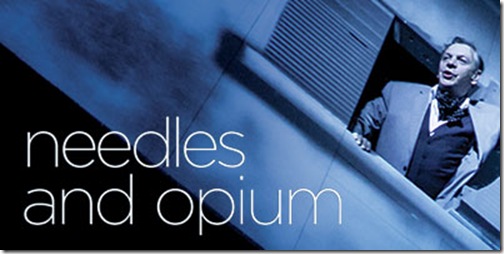Needles and Opium: The Paradox of Promise and Pain at the CanStage Bluma Appel Theatre in Toronto.
Reviewed from Toronto in December, 2013
Categories: Professional Theatre, Théâtre français
Lepage’s Needles and Opium begins with a paradox, that of acupuncture points that when activated by needles relieve pain, but were discovered in the search for maximum effect during torture. However, the more exquisite paradox of Needles and Opium is present in the dislocation of the human heart as it searches for relief from the suffering of love denied, suspended in the space between longing for the object of one’s desire and the knowledge that such love is now forever beyond reach. Remembered love holds both promise and pain. Thus begins a journey through space and time of the tortured soul buffeted by the physical and emotional gravitational forces of memory and longing.
If this sounds complex, picture a box, a square space that is a simple room, but a room slowly revolving through space in which characters come and go desperately in need of a firm footing in a world which allows no such thing. Marc Labrèche & Wellesley Robertson tumble and roll through this box and its parallel universes, connected by a shared state of loneliness. As the suspended box-room revolves – a wonderful special effect of theatrical ingenuity – the actors brace themselves against a constantly shifting gravitational pull that has them sliding off a bed, or diving through windows in freefall, while all the time constrained by their boxed universe. In this play, it’s what’s inside the box that matters.
Rather than a story line with a beginning, middle, and end, Lepage’s Needles is all about creating a unique experience for each individual member of the audience. Despite having an element of spectacle, Needles and Opium is just the opposite; while there is an element of awe to what Lepage accomplishes on stage, his special effects are deployed to create a psychological state. This is theatre that targets the unconscious, or the soul.
The characters are presented in two juxtaposed states of existence, Labrèche’s lonely Québécois trying unsuccessfully to extricate himself from the bonds of a former love, and Wellesley’s Miles Davis touring Paris during the late 1940s jazz age. Love is the addition that Labrèche cannot escape, mirroring Davis’ addiction to heroin. When Labrèche enters the cleverly transformed box, now a psychiatrist’s office, he confesses that he "failed some courses and ended up in theatre", and then in the drifting dialogic snatches that characterizes the play, he also notes that "Quebec is fundamentally a theatrical society." When he tries to address the real reason for his visit, his collapsed love affair, he becomes speechless with grief. While this may sound a bit disjointed, it is such moments of insight coupled with the delightfully original and unexpected design aesthetics of the production that provide the viewer with a memorable series of images and observations. Needles and Opium seduces as it slowly revolves around the unanswerable question: what is the cure for love?
Inspired by Jean Cocteau’s Lettre aux Américains upon his discovery of New York, and Miles Davis’ 1949 visit to Paris, the play is imbued with the melancholy strains of Parisian jazz. These multi-layered literary and musical allusions need not be studied or known in advance to appreciate what is essentially a sensual theatrical meditation on the nature of love and loss. We can all appreciate the dilemma of the lonely Labrèche desperate for the oblivion of sleep in the Hotel La Louisiane tormented by the irritating vocal incursions of the couple next door making noisy love. The play has many such humourous moments. But all is underscored by the muscularity of a powerful vision of what theatre can do, and how real magic can be achieved while engaged in the search for meaning and truth that both nurtures – and ravages – the human heart.
Needles and Opium will play in French, May 6 to 31, 2014 at Théatre du Nouveau Monde.
Needles and Opium
An Ex Machina production, presented by Canadian Stage,
in Co-Production with Théatre Du Trident, Quebec and
Théatre Du Nouveau Monde, Montreal.
Written by Robert Lepage
Directed by Robert Lepage
Performed by Marc Labrèche & Wellesley Robertson 111
English Production at CanStage, Bluma Appel Theatre
Stage Manager: Adèle Saint-Amand
Assistant Director: Normand Bissonnette
Set Designer: Carl Fillion
Props Designer: Claudia Gendreau
Composer and Sound Designer: Jean-Sébastien Côté
Lighting Designer: Bruno Matte
Costume Designer François St-Aubin
Images Designer: Lionel Arn
